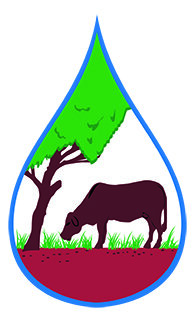Chinee apple
Equates to Dense Thickets of Impenetrable Landscape
Ziziphus mauritiana (Indian Jujube or Indian Ber)
Chinee apple is native to southern Asia and eastern Africa and is mainly associated in North Queensland around areas known for mining from early last century. It was first recorded in the Torres Strait in 1863 and in Townville in 1916.
It is a restricted invasive plant under the Biosecurity Act 2014 and an invasive pest plant in the Charters Towers Region.
Dense infestations of chinee apple produce impenetrable thickets which seriously hamper stock management and reduce property productivity and accessibility.
The low-spreading, shrubby tree can grow up to 8 m tall, densely branched from ground level or just above forming thorny thickets.
Chinee apple making an easy meal for livestock, native and feral animals.
The seeds are most commonly dispersed by large birds and other animals (e.g, livestock, feral pigs and native animals) that eat the fruit. Local graziers have said they have seen chinee apple seeds the scat of both emu and dingo and feral pigs.
Chinee apple tree controlled with basal bark application, bearing viable seed.
Control
See Chinee apple fact sheet for herbicide control and application rates.
Monitoring Chinee apple recently controlled by basal bark herbicide application in our Big Bend Weeds project.
Legal requirements
Chinee apple is a restricted invasive plant under the Biosecurity Act 2014.
It must not be given away, sold, or released into the environment without a permit.
The Act requires everyone to take all reasonable and practical steps to minimise the risks associated with invasive plants and animals under their control. This is called a general biosecurity obligation (GBO).
At a local level, each local government must have a biosecurity plan that covers invasive plants and animals in its area. This plan may include actions to be taken on certain species. Some of these actions may be required under local laws. Contact Charters Towers Regional Council for more information.
Yes Ziziphus mauritiana has a cousin - Ziziphua jujube (Chinese jujube or Chinese date) is a cold-hardy and deciduous species. A story recently aired on ABC Landline of southern Australian farmers making Jujube Beer!




